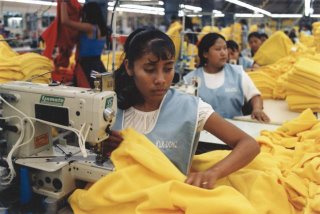Subscribe to
Posts [Atom]
Monday, April 14, 2008
ASU Students Answer Peacock
 WataugaWatch has received a response from the ASU chapter of United Students Against Sweatshops (USAS) to the official statement put out by ASU Chancellor Ken Peacock following the arrest of students in the Administration Building Friday night. (Peacock's statement was posted here as an addendum to the background on the arrests.)
WataugaWatch has received a response from the ASU chapter of United Students Against Sweatshops (USAS) to the official statement put out by ASU Chancellor Ken Peacock following the arrest of students in the Administration Building Friday night. (Peacock's statement was posted here as an addendum to the background on the arrests.)The 18 Misrepresentations of Chancellor Peacock's Message
A USAS response to the Chancellor's misleading letter.
You can reach Peacock at 828-262-2040 and ask to leave a message demanding he drop all charges!
1. I am very disappointed in the outcome of the United Students Against Sweatshops action in the Administration Building this week. Despite our many attempts to have productive dialogue
RESPONSE No attempts at dialogue had been made by ASU until the very day of the sit-in. All meetings were called by USAS, often with months passing before an administrative response or meeting. This process started in September 2006 – 20 months ago.
2. and offer compromises to the students involved, our every effort was rejected
RESPONSE No attempts at compromise were made until Thursday April 10th. The only answer USAS ever received before was "no to the DSP and no to more meetings." The last full day of the sit-in, the administration offered to set specific deadlines to meet on the issue and to be in contact with the 42 other universities that had already signed on – a far cry from adoption of the DSP. The only other effort was when Cindy Wallace said ASU endorses the principles and intent of the DSP and that any students who refuse such an offer as inadequate would be arrested.
3. and we were forced to deal with the realities of the university resources required to allow them to continue to stay through a weekend.
RESPONSE The University has more resources than they'd have you believe. They wanted to staff the building with police officers "for your safety." Apparently ASU is in a budget crisis because it was just too expensive to reallocate one, probably underpaid and underappreciated, officer. The university regularly pays for police during tailgating parties for ASU football games, and that is never seen as a waste of campus resources. It could also be that the day after the arrests, ASU was flooded with 4,000 prospective freshman and parents for Spring Open House. It could have been unsightly to have that problem exposed to potential financial backers.
4. Because our only legal recourse to deal with students refusing to leave the building was to place them under arrest for disorderly conduct, we were forced to take that step.
RESPONSE Students were arrested for 1st degree trespassing and disorderly conduct. Before the arrests, students were told they'd be charged with 2nd degree trespassing.
The chancellor fails to mention another very real and very legal option -- agreeing to conditionally sign on to the DSP as students had demanded.
5. Vice Chancellor for Student Development Cindy Wallace explained the situation to the students prior to that action being taken and warned them of the ramifications of having an arrest record and violating the Student Code of Conduct. Those students who chose to continue to stay were informed of their rights, arrested and led out of the building.
RESPONSE Students were not read their rights. Students lined themselves up, cooperated fully and were peacefully taken to jail.
6. My greatest regret is that, at the end of the day, there has been no positive movement toward addressing the very issue the students say they want to address.
RESPONSE Why, then, did Peacock and his administration shut down negotiations in December of 2007 and refuse to schedule another meeting with no alternatives suggested? Students have been trying to address the issue for years; it is the administration that has failed on that end. We share this regret.
7. This group has had multiple meetings with both my representatives and myself in the last six months
RESPONSE There were only two such meetings in the last six months. One was actually official and took place on December 6th, 2007, in which Dayton Cole and Lorin Baumhover rejected student requests and shut down dialogue indefinitely. The only one with the Chancellor was on Feb 14th, 2008, in which he granted an unscheduled meeting because a friendly administrator asked him to. It may have also concerned him the amount of media members we had present. That meeting addressed nothing.
8. and I provided them with a written response to their concerns on March 19.
RESPONSE Written response was given as the only communication between Feb. 14th and March 19th, which was the deadline to have achieved several serious and explicit goals regarding the issue including having meetings and outlining specific concerns that they had with the issue. His February 14th promise to reopen dialogue apparently meant sending out one email that also said no.
9. We also have been in consultation with the other campuses in the UNC System and no other institution has accepted their demands.
RESPONSE We weren't demanding anything of other UNC schools – just ASU. There are, however, four NC and 150+ national chapters pushing for the same thing.
10. The University's commitment to seek and follow policies and programs that are both lawful and effective in eliminating sweatshops remains steadfast
RESPONSE An appropriate response here might be, "prove it." What has ASU done that they weren't required to do already? All the rhetoric of preparing students to be global citizens and making ASU a leader in sustainability seems pretty hollow considering the decidedly careless manner in which they have addressed this important issue.
11. and we will continue our membership in the Fair Labor Association, which has been promoting safe and healthy production and labor practices for many years.
RESPONSE The FLA is little more than a manufacturers' charade. Its board is headed by the very companies that it is designed to investigate, it refuses to do out-of-factory interviews, it refuses to release factory locations, and it has little transparency in its factory reports -- most of which are kept secret. It is a poor excuse for an independent, effective monitoring organization.
12. Appalachian State University works diligently to ensure that our licensed products meet acceptable standards.
RESPONSE How? Such hollow statements are a slap in the face to people who really have worked for years to affect true change. Appalachian, sadly, has done little more than stonewalling and paper-pushing on the issue of sweatshops. Who denotes what acceptable labor standards are? Clearly students, Faculty Senate and SGA have different gauges by which to qualify these standards.
13. It is clear to me that these students and the University have those goals in common. Our only disagreement is a difference of opinion in how to achieve those goals most effectively.
RESPONSE "Difference of opinion"?! ASU: do nothing until we are forced to. Students and USAS: do something until there's nothing left to do.
14. We have repeatedly assured the students that if they have information regarding illegal or unacceptable practices by any company producing items for Appalachian we will immediately investigate and take appropriate actions.
RESPONSE Again, "repeatedly assured" in this case means "told one time the day before we sent you to jail."
15. We have yet to receive any information from the students in that regard
RESPONSE It's rather difficult to send email from a jail cell. But honestly, back in the Fall of 2006 USAS did provide evidence that sweatshops are an issue in the university apparel market. Unfortunately, it was impossible for us to get any data on ASU-specific factories because, as stated before, ASU uses a potentially corrupt monitoring body that doesn't release factory locations or full reports.
16. so their claim that Appalachian supports sweatshop labor is unsupported.
RESPONSE Sweatshops are, unfortunately, an industry standard for apparel manufacturing. Without programs like the DSP, sweatshops run rampant. It is no secret that almost all factories that are investigated have been found to have serious labor rights abuses. USAS fears that the insufficiencies of the FLA will fail to uncover these violations. The adoption of the DSP would eliminate any potential for such violations to persist.
17. I hope this dialogue with the students can continue in a more productive format and with mutual respect for everyone who has been involved.
RESPONSE From the disrespectful communication that students have received from the very beginning, this may not be the most genuine statement. It is true, USAS responded in kind to these unprofessional tactics. Is this an invitation for reopening dialogue? We, too, hope for dialogue. We hope that dialogue will begin in a productive format. We respect and appreciate the time spent by all parties and insist that more is needed.
18. I also hope that we can move forward without the students continuing to resort to tactics that interfere with the day-to-day operations of the University and the Chancellor's office that must be conducted on behalf of our students, faculty and staff.
RESPONSE Simple logic twist here: the wording makes you think that members of USAS are against the interests of students, faculty and staff – as if our actions threaten the greater good. Students were kind, courteous, clean and apologetic the entire time they occupied the building. Staff in the administration building were even thanking us and bringing us food, which we were very grateful for. This sort of critique serves to de-legitimize the issue at hand and brings focus to a disagreement on tactics rather than the much more important disagreement of whether or not to combat injustices.
